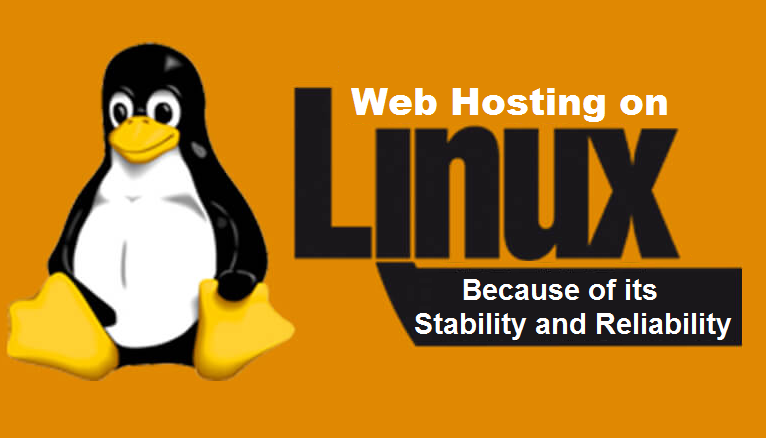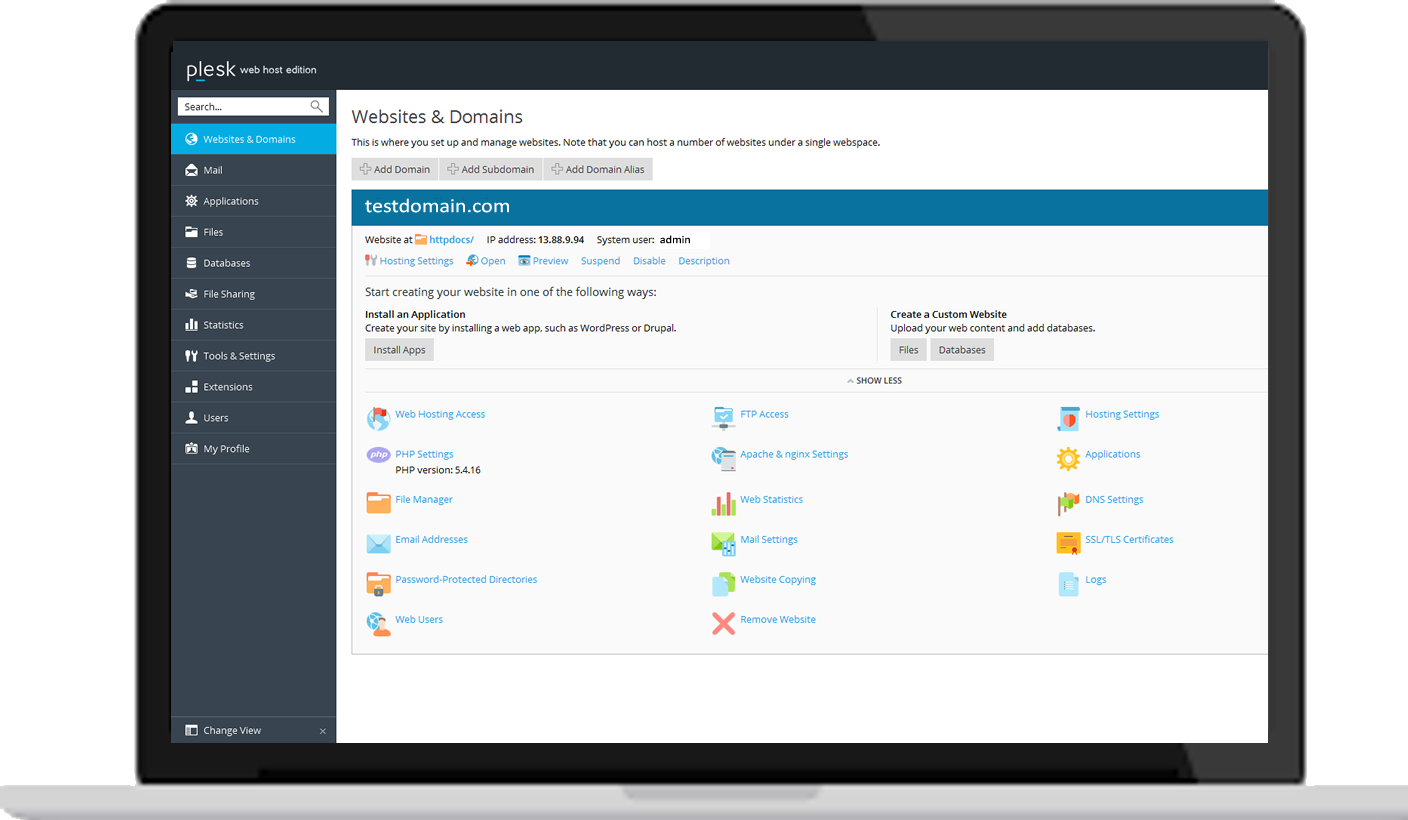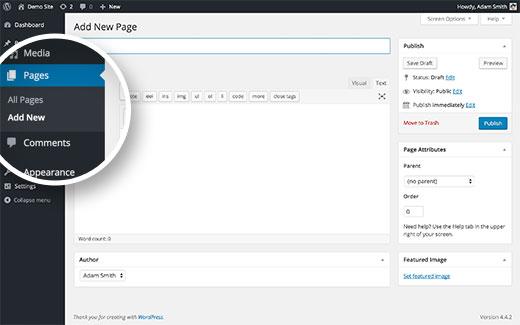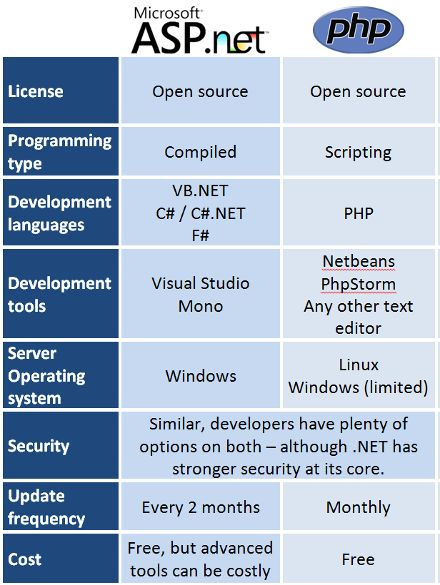Web Hosting: Windows or Linux?
So, you finally decided that you need an account for hosting the website , and now you are wondering: “Linux or Windows?” Fortunately, the difference between them is small, and both options are suitable for most customers. Linux and Windows are the dominant operating systems in website hosting, and although Linux leads by a significant margin, in terms of functions and applications, the differences between them are minimal, so the choice is not obvious. To finally make sure that it is correct, you need to proceed from the way you build your site hosted by the hosting service provider, which tools you plan to use.

Linux and Windows operating systems use different scripts and database languages. So, if you need PHP, Perl, Python, Ruby or MySQL, then choose Linux, if ASP or ASP.NET is Windows. For example:
Of course, this is a greatly exaggerated approach. Windows actually supports most of these development tools, but it is widely believed that Linux hosting is better suited to most client needs.
In fact, in each case, the choice of Linux or Windows depends on the requirements for hosting and on the features of the site. But, considering that about 70% of all sites work on the basis of Linux, there is some advantage behind it. Linux is often considered the best OS for web hosting . It is characterized by stability, reliability, it is well suited for complex environments, blogs, forums, content management systems, online stores.

It is worth taking a closer look at Windows and Linux to understand the differences and advantages of these systems. Typically, such comparisons reduce to application compatibility.
Introduced in 1992, the free modular Linux operating system is in many ways considered the best OS for web servers. In the case of Linux, you will only have to pay for supporting some distributions: although there are free versions of Linux, in a business environment they are usually less popular than commercial software. Due to its reliability, stability and efficiency, Linux has earned a reputation as one of the most advanced options for web and mail servers.

For every web server under Windows there are two under Linux. All major hosting providers work specifically on Linux. Linux is an especially good option for those who are considering using PHP, Perl, Python, Ruby, or MySQL. Windows solutions are usually paid, while Linux offers many Open Source applications for hosting, including various site builders, blogs, forums, Content Management Systems (CMS), and much more. If you want to save money, then Linux might be the best choice, although its support and technical knowledge in this area usually cost money.
Microsoft introduced Windows Server in 1993. Since then, the corporation has become a recognized player in the server operating systems market. Although it is not free, like Linux, Microsoft offers support and updates. One of the strong advantages of Windows over Linux is its ASP.NET web application development environment, although its current versions are also compatible with Linux. In addition, on Windows, SharePoint and Exchange applications make it easier to collaborate on projects. However, Window has a more complex licensing model.
Let's try to compare two options:
Typically, ISPManager, for example, will cost the hosting provider about the same amount for Windows and Linux. This tool is distinguished by detailed settings, clear explanations in the documentation and individual setting of quotas due to user-specific binding. The Plesk and ISPManager panels provide the ability to create or delete an FTP user, specify the path to his home folder, set a limit on disk space and change the password.
Still not sure? Then move on. Trying to solve this dilemma, some come from the wrong assumptions.
Some hosting providers offer Linux for hosting websites, others offer FreeBSD, others offer Windows, or leave the choice to the customer. A common misconception is to assume that the guest OS of the server and its underlying software platform should be identical. This is not true.

Same thing with the client OS. Inexperienced users sometimes think that if the client side uses Windows or Mac OS X, then the same platform is preferable on the side of the web host. This is actually not important. The web host operates on its own, there will be no "compatibility problems". And it will not be easier to work with a web host under Windows if you are already used to Windows on a PC. To access the site, the webmaster uses a web editor like Dreamweaver or KompoZer, FTP, Secure Shell (SSH) or a browser. In other words, whatever OS is used on the host, the interface will be the same. Its simplicity depends on the web editor used on the PC, and not on the host operating system.

Moreover, using such common management tools as Plesk, system administrators work remotely with web servers regardless of the OS used on these servers.
What are the real criteria for choosing a web platform? We’ll clarify again: it depends on what you are going to use on your website. The choice of Linux vs. Windows ”seems complicated only if you don’t know exactly what tools you need.
Will ASP.NET, Microsoft Access or Microsoft SQL Server be required, that is, Windows-specific technologies and products? If the site should support them (on the host side), then, of course, choose Windows. Other options are possible, but less “headache”.

Need PHP, Perl, WordPress, Blogging Software, MySQL? Or just a site without special requirements, like a blog? Then Linux or FreeBSD is suitable. There are many products for these systems, for example, for creating and publishing blogs, and on the Internet there are many guides for configuring and administering web servers.
PHP, Perl and MySQL will work under Windows, but not quite the same as under Linux / Unix. And ready-made PHP / Perl scripts for working under Windows may require modification. Since Linux is the most popular OS on web servers, more applications and tools have been created for it, therefore, if you do not need specific Windows applications, such as ASP, ASP.NET, Microsoft SQL Server, Microsoft Access, Microsoft Exchange, Microsoft SharePoint, Visual Basic, C #, Remote Desktop, it would be logical to choose Linux.
Linux OS will also be needed if you plan to use SSH, scripts and applications for which you need some Apache modules, control panels for Linux. For example, with Linux, the ISPManager control panel (when hosting Linux Shared, VPS or Linux Dedicated Server), Web Host Manager (VPS and Linux Dedicated Server) is often used. On Windows, Plesk (Windows Shared and Dedicated Server). Another difference between Linux and Windows: in Linux, the case of characters in file names is different, in Windows - no.

Windows offers tools such as ASP.NET for creating web pages and MS SQL Server for working with databases. To manage content - articles and news posted on the website, photos and videos - often use tools such as WordPress or Joomla.

Most web projects under Linux can be easily ported under Windows. The converse is not true.
There are various Linux distributions, for example, the popular Ubuntu (33.9% of Linux web servers work on it), Debian (31.5%), CentOS (20.6%). Not very experienced users will use such an option as CentOS with ISPManager. However, by the criterion of “ease of use”, Windows Server is considered the best choice. In fact, the criterion “something simpler for me” refers not so much to the web host operating system as to the tools for managing the site installed on your PC.
Windows servers provide powerful access control and central authentication through Active Directory. Linux servers offer a robust file authorization system. CloudLinux provides enhanced security and account isolation for a multi-tenant environment.
With the release of Windows Server 2008, 2012 and 2016, this operating system is at least as good as Linux security, and even surpasses it in some ways.
To summarize:
Platform Features
Scripts
Database
Recent advances in operating systems, and especially in the area of their compatibility and interoperability, have significantly brought together offers from hosting providers regarding the set of Windows and Linux functions available when creating websites. If earlier it was possible to clearly distinguish the advantages of a particular platform for specific applications, now these differences have been minimized. You can safely choose which of the two operating systems best suits your needs, and you are unlikely to make a mistake. If doubts remain, then the hosting provider will help you decide.

Linux and Windows operating systems use different scripts and database languages. So, if you need PHP, Perl, Python, Ruby or MySQL, then choose Linux, if ASP or ASP.NET is Windows. For example:
| Development tools | Linux | Windows |
| WordPress or other web applications | ✓ | - |
| Dreamweaver or other WYSIWYG applications | ✓ | - |
| PHP, MySQL, CGI, Python or Perl | ✓ | - |
| ASP, ASP.NET, MS SQL | - | ✓ |
| ASP, ASP.NET and PHP, MySQL | - | ✓ |
Of course, this is a greatly exaggerated approach. Windows actually supports most of these development tools, but it is widely believed that Linux hosting is better suited to most client needs.
In fact, in each case, the choice of Linux or Windows depends on the requirements for hosting and on the features of the site. But, considering that about 70% of all sites work on the basis of Linux, there is some advantage behind it. Linux is often considered the best OS for web hosting . It is characterized by stability, reliability, it is well suited for complex environments, blogs, forums, content management systems, online stores.

What is the difference?
It is worth taking a closer look at Windows and Linux to understand the differences and advantages of these systems. Typically, such comparisons reduce to application compatibility.
Introduced in 1992, the free modular Linux operating system is in many ways considered the best OS for web servers. In the case of Linux, you will only have to pay for supporting some distributions: although there are free versions of Linux, in a business environment they are usually less popular than commercial software. Due to its reliability, stability and efficiency, Linux has earned a reputation as one of the most advanced options for web and mail servers.

For every web server under Windows there are two under Linux. All major hosting providers work specifically on Linux. Linux is an especially good option for those who are considering using PHP, Perl, Python, Ruby, or MySQL. Windows solutions are usually paid, while Linux offers many Open Source applications for hosting, including various site builders, blogs, forums, Content Management Systems (CMS), and much more. If you want to save money, then Linux might be the best choice, although its support and technical knowledge in this area usually cost money.
Microsoft introduced Windows Server in 1993. Since then, the corporation has become a recognized player in the server operating systems market. Although it is not free, like Linux, Microsoft offers support and updates. One of the strong advantages of Windows over Linux is its ASP.NET web application development environment, although its current versions are also compatible with Linux. In addition, on Windows, SharePoint and Exchange applications make it easier to collaborate on projects. However, Window has a more complex licensing model.
Let's try to compare two options:
| | Windows Web Hosting | Linux web hosting |
| Software type | Proprietary | Open source |
| Web server | Microsoft IIS | Apache, Nginx |
| Scripting languages | VBScript, ASP.NET | Perl, PHP, Python, Ruby |
| Database | MSSQL, Microsoft Access | MySQL MariaDB |
| Administration software | ISPManager, Plesk | ISPManager, cPanel, Plesk, Confixx |
| Other | Exchange, .NET-Applications, SharePoint | WordPress, Joomla, etc. |
Typically, ISPManager, for example, will cost the hosting provider about the same amount for Windows and Linux. This tool is distinguished by detailed settings, clear explanations in the documentation and individual setting of quotas due to user-specific binding. The Plesk and ISPManager panels provide the ability to create or delete an FTP user, specify the path to his home folder, set a limit on disk space and change the password.
Still not sure? Then move on. Trying to solve this dilemma, some come from the wrong assumptions.
Clients and Servers
Some hosting providers offer Linux for hosting websites, others offer FreeBSD, others offer Windows, or leave the choice to the customer. A common misconception is to assume that the guest OS of the server and its underlying software platform should be identical. This is not true.

Same thing with the client OS. Inexperienced users sometimes think that if the client side uses Windows or Mac OS X, then the same platform is preferable on the side of the web host. This is actually not important. The web host operates on its own, there will be no "compatibility problems". And it will not be easier to work with a web host under Windows if you are already used to Windows on a PC. To access the site, the webmaster uses a web editor like Dreamweaver or KompoZer, FTP, Secure Shell (SSH) or a browser. In other words, whatever OS is used on the host, the interface will be the same. Its simplicity depends on the web editor used on the PC, and not on the host operating system.

Moreover, using such common management tools as Plesk, system administrators work remotely with web servers regardless of the OS used on these servers.
Technology and Tools
What are the real criteria for choosing a web platform? We’ll clarify again: it depends on what you are going to use on your website. The choice of Linux vs. Windows ”seems complicated only if you don’t know exactly what tools you need.
Will ASP.NET, Microsoft Access or Microsoft SQL Server be required, that is, Windows-specific technologies and products? If the site should support them (on the host side), then, of course, choose Windows. Other options are possible, but less “headache”.

Need PHP, Perl, WordPress, Blogging Software, MySQL? Or just a site without special requirements, like a blog? Then Linux or FreeBSD is suitable. There are many products for these systems, for example, for creating and publishing blogs, and on the Internet there are many guides for configuring and administering web servers.
PHP, Perl and MySQL will work under Windows, but not quite the same as under Linux / Unix. And ready-made PHP / Perl scripts for working under Windows may require modification. Since Linux is the most popular OS on web servers, more applications and tools have been created for it, therefore, if you do not need specific Windows applications, such as ASP, ASP.NET, Microsoft SQL Server, Microsoft Access, Microsoft Exchange, Microsoft SharePoint, Visual Basic, C #, Remote Desktop, it would be logical to choose Linux.
Linux OS will also be needed if you plan to use SSH, scripts and applications for which you need some Apache modules, control panels for Linux. For example, with Linux, the ISPManager control panel (when hosting Linux Shared, VPS or Linux Dedicated Server), Web Host Manager (VPS and Linux Dedicated Server) is often used. On Windows, Plesk (Windows Shared and Dedicated Server). Another difference between Linux and Windows: in Linux, the case of characters in file names is different, in Windows - no.

Windows offers tools such as ASP.NET for creating web pages and MS SQL Server for working with databases. To manage content - articles and news posted on the website, photos and videos - often use tools such as WordPress or Joomla.

Most web projects under Linux can be easily ported under Windows. The converse is not true.
Ease of use
There are various Linux distributions, for example, the popular Ubuntu (33.9% of Linux web servers work on it), Debian (31.5%), CentOS (20.6%). Not very experienced users will use such an option as CentOS with ISPManager. However, by the criterion of “ease of use”, Windows Server is considered the best choice. In fact, the criterion “something simpler for me” refers not so much to the web host operating system as to the tools for managing the site installed on your PC.
Security
Windows servers provide powerful access control and central authentication through Active Directory. Linux servers offer a robust file authorization system. CloudLinux provides enhanced security and account isolation for a multi-tenant environment.
With the release of Windows Server 2008, 2012 and 2016, this operating system is at least as good as Linux security, and even surpasses it in some ways.
To summarize:
Platform Features
| Performance | If the site is managed by an experienced administrator, then the speed on both platforms is comparable. |
| Stability | Currently, the differences in this indicator between servers under Windows and Linux are negligible. |
| Static Pages | In terms of hosting static HTML files, Windows and Linux are almost identical. |
| Ease of use | Interaction with the web hosting system occurs mainly through FTP or the server control panel. It is unlikely that you will need a graphical Windows interface. |
| Security | This is a topic for discussion, but in reality it is practically no different. |
| Web server | On Linux, this is almost always Apache, on Windows, the Internet Information Server (IIS). There is Apache for Windows, but hosting companies rarely use it. There are other options, but these two are the most common. |
Scripts
| Cgi | Unix or Linux. |
| Perl | Linux or Windows. |
| Php | Linux or Windows (usually Linux). |
| ASP | Windows (Visual Basics and VB Scripting). Although ASP is ported to Linux, hosting companies rarely offer it under Linux. |
| ASP.NET | The server-side application development environment for Windows allows you to create dynamic web pages. |
Database
| MySQL | The most common DBMS on Linux servers. It is also available under Windows: hosting companies are increasingly offering it. MySQL is a reliable and powerful Open Source database engine for any website. Cheap alternative to Oracle and Microsoft products. |
| Microsoft Access | Access integrates the Microsoft Jet Database Engine relational engine, graphical user interface and software development tools. Included in Microsoft Office and available only on Windows. If you need a very simple database, then Access is the best choice. But this product is significantly less powerful than Oracle, MySQL and SQL, and it is not suitable for sites with high traffic. |
| Other DBMS | Powerful DBMSs such as SQL Server and Oracle can be used through the Open Database Connectivity (ODBC) interface. Typically, such a mechanism is used in Windows, but this is beyond the scope of standard hosting packages. Oracle is a very popular platform for heavy traffic sites using DBMS. |
Recent advances in operating systems, and especially in the area of their compatibility and interoperability, have significantly brought together offers from hosting providers regarding the set of Windows and Linux functions available when creating websites. If earlier it was possible to clearly distinguish the advantages of a particular platform for specific applications, now these differences have been minimized. You can safely choose which of the two operating systems best suits your needs, and you are unlikely to make a mistake. If doubts remain, then the hosting provider will help you decide.
